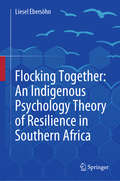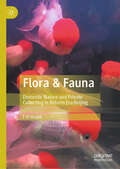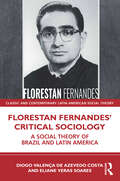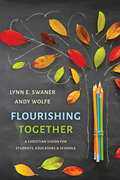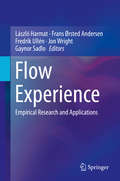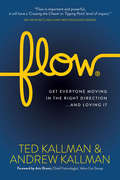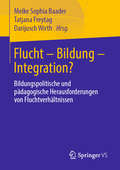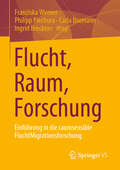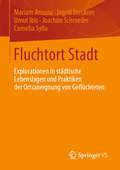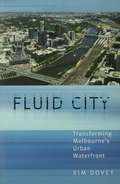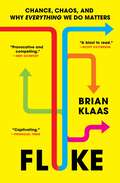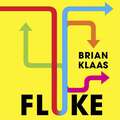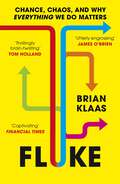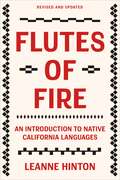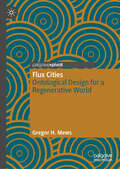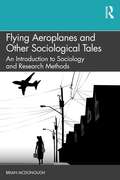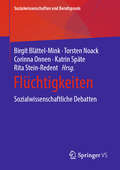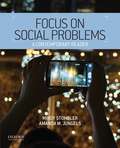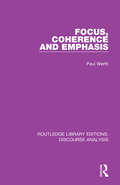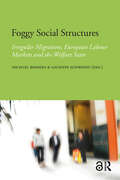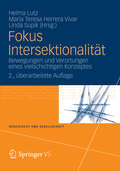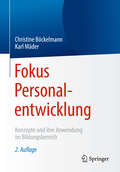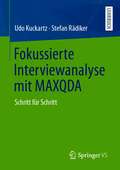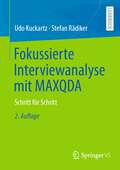- Table View
- List View
Flocking Together: An Indigenous Psychology Theory of Resilience in Southern Africa
by Liesel EbersöhnThis book describes how those individuals who are often most marginalised in postcolonial societies draw on age-old, non-western knowledge systems to adapt to the hardships characteristic of unequal societies in transformation. It highlights robust indigenous pathways and resilience responses used by elders and young people in urban and rural settings in challenging Southern African settings (South Africa, Namibia, Lesotho and Swaziland) to explain an Indigenous Psychology theory. Flocking (rather than fighting, fleeing, freezing or fainting) is explained as a default collectivist, collaborative and pragmatic social innovation to provide communal care and support when resources are constrained, and needs are par for the course. Flocking is used to address, amongst others, climate change (drought and energy use in particular), lack of household income and securing livelihoods, food and nutrition, chronic disease (specifically HIV / AIDS and tuberculosis), barriers to access services (education, healthcare, social welfare support), as well as leisure and wellbeing. The book further deliberates whether the continued use of such an entrenched socio-cultural response mollifies citizens and decision-makers into accepting inequality, or whether it could also be used to spark citizen agency and disrupt longstanding structural disparities.
Flora & Fauna: Domestic Nature and Private Collecting in Reform Era Beijing
by I-Yi HsiehThis book is about the intimacy and shared changes of life in domestic nature cultivation in Beijing. It asks a simple question: how do people express themselves when the state control on communication is severely tightened and the public space is increasingly replaced by the marketplace? By bringing to the fore an ethnography of the rise of Flora and Fauna—the aesthetic practice of cultivating nature at home—this book tends to the transformation of the classic Chinese practice of collecting, shoucang, and tells how, against a retreating horizon of free speech, a symbolism of nature arises as anchor for affective commentaries on history, the self, and politics. With the poetics of nature becoming forms of expressive culture, this book charts the domestic as politically charged space wherein aesthetic sovereignty is negotiated. Flora and Fauna urges us to reconsider the aesthetics of nature and politics of domestication, amid the tremendous social transformation annotated by market crises in China today.
Florestan Fernandes’ Critical Sociology: A Social Theory of Brazil and Latin America (Classic and Contemporary Latin American Social Theory)
by Diogo Valença de Azevedo Costa Eliane Veras SoaresThis book intends to familiarise the reader with the political and sociological thought of Florestan Fernandes, covering the range of his research themes and socialist militancy between the 1940s and 1990s. Considered the founding father of sociology in Brazil, Florestan Fernandes’ work is essential for an understanding of the historical and political dilemmas of Brazilian and Latin American societies. His main themes encompass research on folklore, indigenous peoples, race relations between blacks and whites, sociological theory, education, underdevelopment, dependence, Latin American dictatorships and the Brazilian “re- democratization” after 1980, providing a new interpretation of Latin America from the point of view of the lumpen social strata. Following Mannheim’s inspiration, the present work is inserted in the field of sociology of knowledge. It takes an original approach to the ideas of Florestan Fernandes based on the notion of a lumpen thought style. This book is a key resource for readers learning about the history of the social sciences in Latin America, and about the political dilemmas of Latin American societies.
Flourishing Together: A Christian Vision for Students, Educators, and Schools
by Andy Wolfe Lynn E. SwanerHow do students, educators, and schools flourish together—especially in an era of increasing pressure from standardized testing, growing challenges to student mental health and well-being, and frequent educator burnout? Many schools strive toward academic achievement as their primary marker of success, but this well-meaning approach can lead to a reductionist view in which students are too often seen as statistics rather than whole human beings. Teachers, school leaders, parents, and of course students know that flourishing is a much broader and more holistic aim for education. But what is to be done? The goal of this book is to call Christian educators back to a better vision of flourishing within a robust theological framework, with the practical guidance necessary for implementation. To accomplish this, Lynn Swaner and Andy Wolfe take readers through an exploration of five essential domains identified through extensive empirical research—purpose, relationships, learning, resources, and well-being.An ideal resource for professional development and strategic planning, Flourishing Together persistently adheres to the principle that &“anything that is worth building cannot be built alone.&” Thus, the vision for flourishing here is one in which the school community is understood as an interconnected ecosystem, in which &“each one&’s flourishing is dependent on their flourishing together.&” Accordingly, teachers and administrators will be inspired and equipped to reshape their schools as places where they—alongside their students—can flourish together in a community of abundant life.
Flow Experience
by László Harmat Frans Ørsted Andersen Fredrik Ullén Jon Wright Gaynor SadloThis volume provides updates and informs the reader about the development of the current empirical research on the flow experience. It opens up some new research questions at the frontiers of the field. The book offers an overview on the latest findings in flow research in several fields such as social psychology, neuropsychology, performing arts and sport, education, work and everyday experiences. It integrates the latest knowledge on experimental studies of optimal experience with the theoretical foundation of psychological flow that was laid down in the last decades.
Flow: Get Everyone Moving in the Right Direction . . . and Loving It
by Ted Kallman Andrew KallmanSimple is seldom easy to implement. However, as a recent Flow trainee puts it, “Flow ‘plays nice’ with everyone! And, it will enable you to successfully customize and implement whatever solution you choose.”Flow is the distillation of over fifty years of successful, hands-on experience that has delivered more than 100 million US dollars in value-add to companies in Europe, the United States, and Asia. Putting Flow into practice, one company increased profit $550,000 in one year on $2.5 million of revenue, and a large Asian telecom turned around a mission critical project from a projected 2-year schedule overrun and 300% budget increase to delivering seven months early and $4 million under the original budget in a 90-day period. Ted and Andrew Kallman unify Traditional management and Agile methodologies enabling successful results, regardless of the existing leadership framework. Simple and easy to understand, Flow helps individuals, teams, and organizations create and sustain high performance.
Flucht – Bildung – Integration?: Bildungspolitische und pädagogische Herausforderungen von Fluchtverhältnissen
by Meike Sophia Baader Tatjana Freytag Darijusch WirthIn diesem Band werden Fluchtverhältnisse aus Sicht verschiedener wissenschaftlicher Disziplinen beleuchtet. Zudem wird die Erfahrungsperspektive von Praktiker_innen in unterschiedlichen Handlungsfeldern aufgenommen. Theoretische, historische und bildungspolitische Rahmungen, Formen von Verletzlichkeiten im Kontext von Fluchtverhältnissen sowie Möglichkeiten der Teilhabe und Bildung stehen im Zentrum.
Flucht, Raum, Forschung: Einführung in die raumsensible FluchtMigrationsforschung
by Ingrid Breckner Franziska Werner Philipp Piechura Carla BormannDie Migrationsprozesse von weltweit über 108 Millionen Geflüchteten sind von zunehmender Bedeutung für räumliche Entwicklungen und gleichzeitig stark von räumlichen Grundlagen geprägt. Die Einführung nimmt daher das Verhältnis von Flucht und Raum als verknüpfte soziale Strukturierungsprozesse in den Blick. Autor*innen aus Wissenschaft und Praxis führen in Konzepte und Befunde raumsensibler FluchtMigrationsforschung ein. Ihre multidisziplinären Beiträge stellen Raumtypen, Rassismus als raumstrukturierenden Faktor, Räume des (Nicht-)Wohnens, die Vielfalt der Akteure der Raumproduktion sowie Grundlagen und Herausforderungen einer gesellschaftstheoretisch fundierten, angewandten und raumsensiblen FluchtMigrationsforschung vor. Zielgruppe sind Wissenschaftler*innen, Studierende und Praktiker*innen aus Stadt- und Fluchtforschung, Architektur, Planung, Sozial-, Kultur- und Gesundheitswissenschaften sowie Sozialer Arbeit und Verwaltung.
Fluchtort Stadt: Explorationen in städtische Lebenslagen und Praktiken der Ortsaneignung von Geflüchteten
by Joachim Schroeder Mariam Arouna Ingrid Breckner Umut Ibis Cornelia SyllaIm Begriff Fluchtort Stadt ist die der Studie zugrunde liegende These ausgedrückt, dass fluchtfolgebedingte Prozesse als ein integraler Bestandteil von Stadtentwicklung betrachtet werden müssen. Bezüge zum Thema Flucht/Geflüchtete und (flucht-)spezifische Entwicklungsprozesse werden am Beispiel von Hamburg auf struktureller Ebene, im administrativ-institutionellen Kontext, in der sozialräumlichen Dimension sowie im gesellschaftlichen Diskurs rekonstruiert. Zentral sind dabei die Perspektiven der Geflüchteten als Akteur_innen, ihre Sicht- und Handlungsweisen und individuelle Aneignungspraktiken am Fluchtort Stadt.
Fluid City: Transforming Melbourne's Urban Waterfront
by Kim DoveyFluid City traces the transformation of the urban waterfront of Melbourne, the re-vitalization of the Yarra River waterfront, Melbourne Docklands and Port Philip Bay. As the financial and industrial centre of Australia, in the late nineteenth century, Melbourne developed a new world exuberance. Yet the twentieth century saw Melbourne suffering from a declining industrial and economic base. The city in the 1980s was de-industrialising, and the re-facing of the city to the water was a key urban strategy of the 1980s and 90s and a catalyst for economic transformation. This book bridges significant gaps between different discourses about the city and to challenge singular ways of viewing the city.
Fluid New York: Cosmopolitan Urbanism and the Green Imagination
by May JosephHurricane Sandy was a fierce demonstration of the ecological vulnerability of New York, a city of islands. Yet the storm also revealed the resilience of a metropolis that has started during the past decade to reckon with its aqueous topography. In Fluid New York, May Joseph describes the many ways that New York, and New Yorkers, have begun to incorporate the city's archipelago ecology into plans for a livable and sustainable future. For instance, by cleaning its tidal marshes, the municipality has turned a previously dilapidated waterfront into a space for public leisure and rejuvenation. Joseph considers New York's relation to the water that surrounds and defines it. Her reflections reach back to the city's heyday as a world-class port--a past embodied in a Dutch East India Company cannon recently unearthed from the rubble at the World Trade Center site--and they encompass the devastation caused by Hurricane Sandy in 2012. They suggest that New York's future lies in the reclamation of its great water resources--for artistic creativity, civic engagement, and ecological sustainability.
Fluke: Chance, Chaos, and Why Everything We Do Matters
by Brian KlaasWant to know what chaos theory can teach us about human events? In the perspective-altering tradition of Malcolm Gladwell&’s The Tipping Point and Nassim Nicholas Taleb&’s The Black Swan comes a provocative challenge to how we think our world works—and why small, chance events can divert our lives and change everything, by social scientist and Atlantic writer Brian Klaas.If you could rewind your life to the very beginning and then press play, would everything turn out the same? Or could making an accidental phone call or missing an exit off the highway change not just your life, but history itself? And would you remain blind to the radically different possible world you unknowingly left behind? In Fluke, myth-shattering social scientist Brian Klaas dives deeply into the phenomenon of random chance and the chaos it can sow, taking aim at most people&’s neat and tidy storybook version of reality. The book&’s argument is that we willfully ignore a bewildering truth: but for a few small changes, our lives—and our societies—could be radically different. Offering an entirely new lens, Fluke explores how our world really works, driven by strange interactions and apparently random events. How did one couple&’s vacation cause 100,000 people to die? Does our decision to hit the snooze button in the morning radically alter the trajectory of our lives? And has the evolution of humans been inevitable, or are we simply the product of a series of freak accidents? Drawing on social science, chaos theory, history, evolutionary biology, and philosophy, Klaas provides a brilliantly fresh look at why things happen—all while providing mind-bending lessons on how we can live smarter, be happier, and lead more fulfilling lives.
Fluke: Chance, Chaos, and Why Everything We Do Matters
by Dr Brian KlaasWhy small, chance events can divert our lives and change how we think our world works.If you could rewind your life to the very beginning and then press play, would everything turn out the same? Or could making an accidental phone call or missing an exit off the highway change not just your life, but history itself? And would you remain blind to the radically different possible world you unknowingly left behind?In Fluke, myth-shattering social scientist Brian Klaas dives deeply into the phenomenon of random chance and the chaos it can sow, taking aim at most people's neat and tidy storybook version of reality. The book's argument is that we willfully ignore a bewildering truth: but for a few small changes, our lives - and our societies - could be radically different. Offering an entirely new lens, Fluke explores how our world really works, driven by strange interactions and apparently random events. How did one couple's vacation cause 100,000 people to die? Does our decision to hit the snooze button in the morning radically alter the trajectory of our lives? And has the evolution of humans been inevitable, or are we simply the product of a series of freak accidents? Drawing on social science, chaos theory, history, evolutionary biology, and philosophy, Klaas provides a brilliantly fresh look at why things happen - all while providing mind-bending lessons on how we can live smarter, be happier, and lead more fulfilling lives.Praise for Brian Klaas:'Illuminating' Adam Grant'Passionate, insightful, and occasionally jaw-dropping' Peter Frankopan'A brilliant exploration' Dan Snow'You'll never look at the world the same way again' Ian Dunt(P) 2024 Hodder & Stoughton Limited
Fluke: Chance, Chaos, and Why Everything We Do Matters
by Dr Brian Klaas'Consistently gripping - dazzling in its sweep and thrillingly brain-twisting in its arguments' Tom HollandA provocative new vision of how our world really works - and why chance determines everything. In Fluke, myth-shattering social scientist Brian Klaas deep-dives into the phenomenon of randomness, unpicking our neat and tidy storybook version of events to reveal a reality far wilder and more fascinating than we have dared to consider. The bewildering truth is that but for a few incidental changes, our lives - and our societies - would be radically different.Offering an entirely new perspective, Fluke explores how our world really works, driven by strange interactions and random events. How much difference does our decision to hit the snooze button make? Did one couple's vacation really change the course of the twentieth century? What are the smallest accidents that have tilted the course of history itself? The mind-bending lessons of this phenomenon challenge our beliefs about the very workings of the world. From the evolution of human biology and natural disasters to the impact of global events on supply chain disruptions, every detail matters because of the web of connectivity that envelops us. So what if, by exploding our illusion of control, we can make better decisions and live happy, fulfilling lives?
Flutes of Fire: An Introduction to Native California Languages Revised and Updated
by Leanne HintonAn essential book on California’s Indigenous languages, updated for the first time in over 25 years Before outsiders arrived, about one hundred distinct Indigenous languages were spoken in California, and many of them are in use today. Since its original publication in 1994, Flutes of Fire has become one of the classic books about California’s many Native languages. It is written to be approachable, entertaining, and informative—useful for people doing language revitalization work in their own communities, for linguists, and for a general readership interested in California’s rich cultural heritage. With significant updates by the author, this is the first new edition of Flutes of Fire in over 25 years. New chapters highlight the exciting efforts of language activists in recent times, as well as contemporary writing in several of California’s Native languages. Both a practical guide and a joy to read, Flutes of Fire is an essential book for anyone who cares about the Indigenous languages of California and their flourishing for many generations to come.
Flux Cities: Ontological Design for a Regenerative World
by Gregor H. MewsAs our larger life-giving systems that sustain livelihoods continue to erode at an unprecedented rate, and urban complexities continue to increase, this book presents a refreshingly unconventional, creative, and radical meditation on urbanism and city living. Greg Mews proposes the idea of &‘Flux Cities&’ and offers provocative new ways to inquire into non-linear relations to the city, through questions such as: How can we design from the heart? How to approach the real city and produce for (co)existence? How to navigate the intangible city? How to improve well-being through Flux Cities? Full of agency, Mews presents deep and personal insights on informal settlements, public space, and the role of Do-It-Yourself Urbanism in enabling spatial justice and regenerative practices towards well-being. A compelling read for anyone willing to shake up the normative existential foundations of cities.
Flying Aeroplanes and Other Sociological Tales: An Introduction to Sociology and Research Methods
by Brian McDonoughFlying Aeroplanes and Other Sociological Tales is an introductory textbook for students wishing to learn about sociology and social research methods. Each of the short tales, told by a sociologist, introduces topics and research methods using an engaging storyline. The opening story narrates how the sociologist uses participant observation to understand the work of a commercial pilot, and how he feels about autopilot systems replacing his job of flying aeroplanes. Other tales feature topics such as education, health, crime, and gender. There is also a chapter on ‘lockdown’ during the Covid-19 pandemic. One main feature of the book is the ‘back door’ approach to teaching research methods, with chapters dedicated to exploring statistics, sampling, visual methods, documents, embodied methods, autoethnographic research and ethics. Traditional textbooks in sociology focus on what novice sociologists should do, but few, if any, comprehensively deal with overcoming problems as they might emerge and explain what to do when things go wrong. The sociological tales written in this book provide examples of when field access is denied, research participants refuse to take part, and when recording equipment has broken down. Each tale raises issues and problems for the sociologist to overcome, such as research design flaws, sampling bias, lack of rapport with research participants, and the problems with breaking ethical codes of conduct. The book provides insight into the role of the sociologist, why sociology matters, and what happens when sociology fails us. Flying Aeroplanes and Other Sociological Tales introduces a unique approach to teaching sociology and social research methods.
Flüchtigkeiten: Sozialwissenschaftliche Debatten (Sozialwissenschaften und Berufspraxis)
by Birgit Blättel-Mink Katrin Späte Torsten Noack Corinna Onnen Rita Stein-RedentDie Willkommenskultur des Jahres 2015 in Deutschland ist umgeschlagen in eine Abschiebepolitik der Bundesregierung mit Hilfe der (Um-)Definition sicherer Herkunftsländer. Wie lässt sich dieser Politikwandel verstehen und geht er auch mit einem Gesinnungswandel in der Bevölkerung einher? Welche Gründe für und welche gegen die Aufnahme von Flüchtigen gibt es bzw. werden in den Debatten angeführt? Dieser Band versammelt Analysen zum gesellschaftlichen Diskurs im Umgang mit Flüchtlingen, zu Fragen der Arbeitsmarktintegration und zur Praxis der Beratung von Flüchtlingen. Neben wissenschaftlichen Analysen stehen reflektierende Beiträge aus der Praxis der Migrationspolitik.
Focus On Social Problems: A Contemporary Reader
by Mindy Stombler Amanda M. JungelsFocus on Social Problems: A Contemporary Reader exposes students to current issues in the field. The selections in this reader help students understand how social problems are defined and constructed, increase their empirical knowledge about the causes and consequences of social problems, and develop empathy. Working from a critical social constructionist foundation, the readings address a wide variety of social problems. Editors Mindy Stombler and Amanda M. Jungels include a combination of research-based articles and popular media pieces. Each chapter opens with an interview of a social-change activist doing work related to the chapter's featured social problem, giving students an opportunity to envision themselves as agents of social change.
Focus, Coherence and Emphasis (RLE: Discourse Analysis)
by Paul WerthFirst published in 1984, this book examines a number of questions on the boundary of competence and performance — whose solutions have implications for linguistic theory in general. In particular, the form of grammatical statements, the relationship between various rules of grammar, the interaction between sentence in a sequence, and the inferences to be drawn from linguistic behaviour to linguistic knowledge. The author argues that many grammatical processes, inadequately handled by conventional sentence-grammars, require a text grammar in which the basic constitutive processes of information and deixis can be specified. They ago further to investigate the novel hypothesis that emphatic structure provides a crucial condition for the application of transformational rules, paying particular attention to the ‘movement-rules’ using mostly data culled from actual usage.
Foggy Social Structures: Irregular Migration, European Labour Markets and the Welfare State (IMISCOE Research)
by Giuseppe SciortinoIrregular migration systems are giving way to an undocumented population in Europe that is estimated at some millions. The migrants managed to live and work for years without a certified identity yet within ‘foggy’ social structures. What strategies and mechanisms allow them to avoid detection, generate an income and access necessary services? What alternatives are pursued - at whatever human cost - to substitute for political membership and legal protection? How does irregular status impact social interactions? Based on empirical studies carried out across the continent, this book explores how irregular migration systems developed over time to interact with changing European labour markets, welfare regimes and immigration policies. Foggy Social Structures considers such phenomena one of contemporary societies distinctive features, one that challenges existing notions of political statehood as societal membership.
Fokus Intersektionalität
by Linda Supik Helma Lutz María Teresa Herrera VivarDie hier versammelten Beiträge spiegeln den aktuellen Stand der Debatte um Intersektionalität 20 Jahre nach Prägung des Begriffes im Schwarzen Feminismus in den USA. Bei seiner transatlantischen Reise durchlief der Ansatz Metamorphosen und fiel in Europa auf vorbereiteten Boden, insbesondere in anglophonen und deutschsprachigen feministischen Diskursen. Klasse, Geschlecht, Ethnizität und "Rasse", Sexualität, Behinderung, Alter und andere Dimensionen von Ungleichheit und Identität werden inzwischen in intersektioneller Perspektive untersucht. In diesem Band wird der Ansatz vorgestellt und in transdisziplinären und transnationalen Analyseperspektiven wie Diskurstheorie, Biographieforschung, Wissenssoziologie, Rahmenanalyse und Sozialstrukturanalyse verortet; auch werden kritische Interventionen zu Problemen und Grenzen dieses Konzepts diskutiert.
Fokus Personalentwicklung
by Christine Böckelmann Karl MäderFokus Personalentwicklung’ ist ein Handbuch zu allen wichtigen Aspekten von Personalentwicklung im Bildungsbereich. Leserinnen und Leser finden darin klar und verständlich aufbereitetes Grundlagenwissen sowie auf die Schule abgestimmte praxisrelevante Konzepte, Instrumente und Anregungen: Das Werk zeigt Bezüge zwischen Personal-, Team-, Organisations- und Unterrichtsentwicklung auf.Es thematisiert Personalentwicklung als Führungsinstrument und beleuchtet wichtige Hintergrundaspekte zu Arbeit, Gesundheit und Berufslaufbahnen.Es beschreibt anschaulich, was unter einem Personalentwicklungskonzept für Schulen zu verstehen ist und welche Instrumente sich in welcher Form für den Bildungsbereich eignen. Personalentwicklung ist ein zentraler Eckpfeiler für eine gelingende Schulentwicklung und gleichzeitig eine große Herausforderung. Das Buch bietet bei der praktischen Umsetzung eine essenzielle Unterstützung für alle Schulleiterinnen und Schulleiter sowie Lehrkräfte, Dozierende an Hochschulen, Beratungsfachleute und Mitarbeitende von Bildungsverwaltungen. Des Weiteren enthält es einen profilierten Gastbeitrag von Prof. Dr. Karlheinz Sonntag, einem der bedeutendsten Arbeits- und Organisationspsychologen im Bereich der Personalentwicklung. Das Werk erscheint als komplett überarbeitete und ergänzte Neuauflage.
Fokussierte Interviewanalyse mit MAXQDA: Schritt für Schritt
by Udo Kuckartz Stefan RädikerQualitative Interviews erfreuen sich als Erhebungsmethode sehr großer Beliebtheit, wobei die Gesprächsgegenstände meist vorab festgelegt und in einem Leitfaden festgehalten werden. Die in diesem Lehrbuch vorgestellte fokussierte Interviewanalyse gibt detaillierte Empfehlungen, wie solche Interviewdaten systematisch und methodisch kontrolliert ausgewertet werden können. In sechs Schritten wird die praktische Vorgehensweise der fokussierten Interviewanalyse unter Einsatz der Software MAXQDA auf verständliche Weise beschrieben.
Fokussierte Interviewanalyse mit MAXQDA: Schritt für Schritt
by Udo Kuckartz Stefan RädikerEntdecken Sie in diesem Lehrbuch eine effektive Methode zur Auswertung qualitativer Interviews: die fokussierte Interviewanalyse. Erfahren Sie, wie Sie mit dieser spezifischen Anwendung der qualitativen Inhaltsanalyse Ihre Interviewdaten systematisch und methodisch kontrolliert auswerten können. In sechs einfachen Schritten wird Ihnen die praktische Vorgehensweise der fokussierten Interviewanalyse anschaulich vermittelt, unterstützt durch die effiziente Software MAXQDA. Erweitern Sie Ihre Forschungsmöglichkeiten und setzen Sie die fokussierte Interviewanalyse erfolgreich in Ihren Projekt um.
